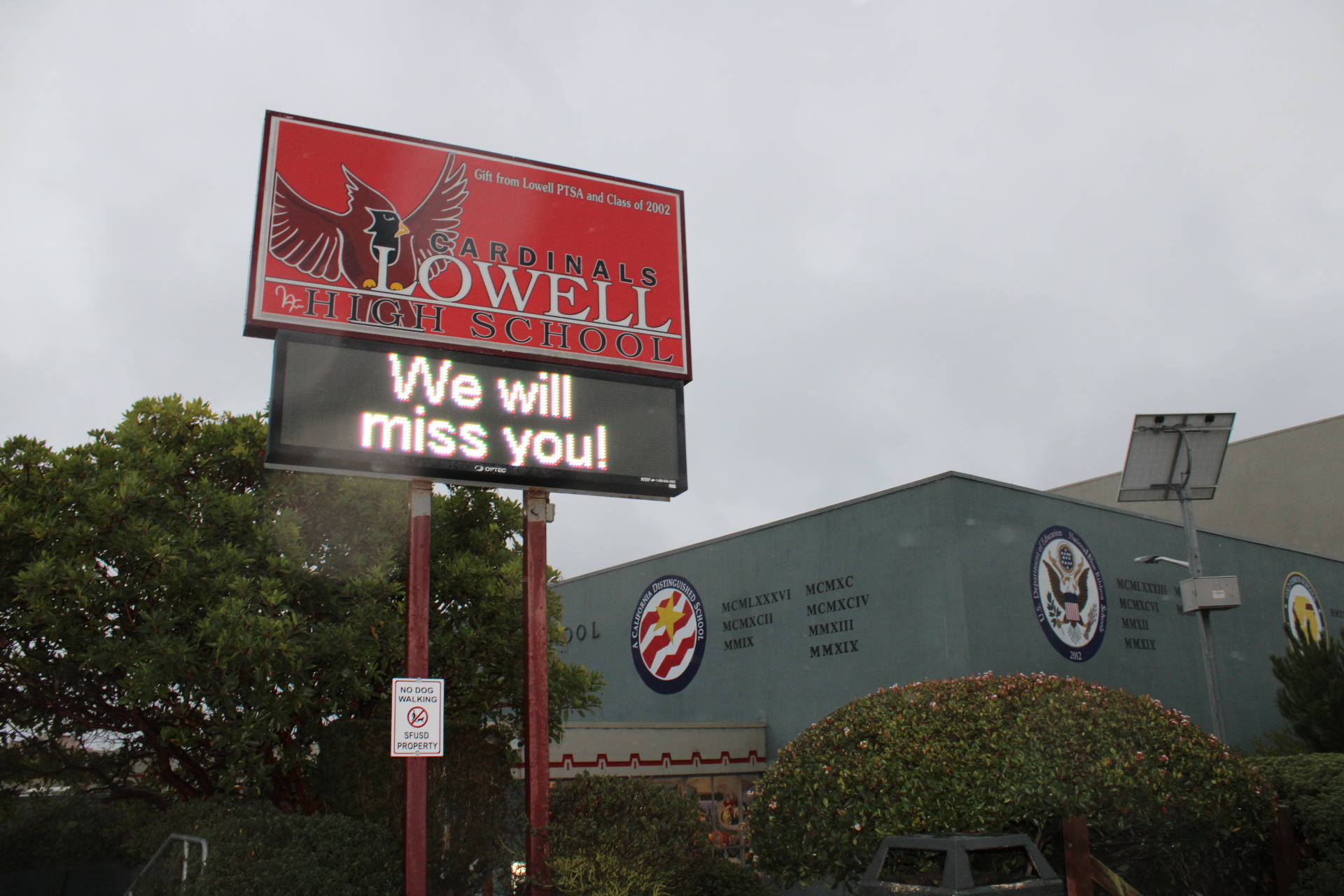The San Francisco Board of Education unanimously voted on October 20 to shift Lowell High School admissions to a lottery system for the class of 2025.
Lowell High School is widely regarded as a public magnet school, offering a rigorous curriculum and many AP classes that are not offered at other public high schools in San Francisco.

Photo by Charlotte Kane
On October 13, the San Francisco Unified School District (SFUSD) Board of Education held a Committee of the Whole meeting. This is a meeting that all assembly members are invited to attend, where they can offer and debate their opinions. Members do not vote on any legislation at these meetings, rather they engage in debate and suggest legislation. The SFUSD Board of Education held a Committee of the Whole meeting to discuss a resolution that “suspends Board policy 5120.1 for the 2020-2021 admissions cycle and replaces the Lowell High School admissions process with the general comprehensive high school admissions process described in Board Policy 5101.”
Lowell usually admits students based on their middle school GPA and score on the Lowell Admissions Test, which separates Lowell admissions from other public high schools in San Francisco.
Due to the fact that many applicants are no longer able to take the Lowell Admissions Test or provide grades from their second semester of seventh grade because of the coronavirus pandemic, School Board members reasoned that using a lottery system was the most equitable way of admitting students for the upcoming year.
At the first Committee of the Whole meeting where this change was initially proposed, some Lowell and prospective parents felt blindsided and cheated. One parent stood up to publicly comment that this decision would be unfair to the kids that gave up other activities to get the grades necessary for Lowell admission and who could not afford private school.
Some public commenters said that Lowell keeps its level of academic rigor because of the students there and were concerned that a lottery system would admit students that could not uphold these standards.
Other comments supported the board’s decision. Many parents were excited that the resources offered at Lowell could benefit a more diverse group of students, who were just as intelligent and worthy of a rigorous education.
During this Committee of the Whole meeting, board member Alison Collins also pointed out the inherent racism and ableism present in meritocracies such as Lowell, as they measure wealth and access to resources such as private tutors over intelligence.
Student representative Kathya Correa Almanza spoke at this Committee of the Whole meeting. “I’ve heard [parents say] in public comments that [students] are going to be put in a dangerous situation [at a public school other than Lowell],” she said during an interview. “I don’t know about you, but to me, that sounds like a racist sentiment, that if my student goes to a school with more people of color than I know Lowell has, they’re going to be in a dangerous situation.” Almanza went on to explain that “there’s a lot of racism that goes on [at Lowell]” which is often ignored because of how highly regarded the school is.
A parent at Lowell who wishes to stay anonymous added to this statement. “There is a climate [at Lowell] that doesn’t feel fully supportive of diversity, and I’m concerned about that,” they said. As someone who benefits from white privilege, “my place comes from global concerns, less about my particular student there,” they explained, “because I don’t know how much this has directly impacted [my student].”
Grace Cookston, a senior at Lowell, believes that the school has maintained its image of being academically rigorous because “it has this history of being an elitist school,” not necessarily because of the students that go there. Cookston explains that students at other public high schools are just as intelligent “but as a Lowell student, I see the pressure that kids put on themselves just because they go to Lowell.”
Another anonymous Lowell parent echoed Cookston’s sentiment. “People will still be selecting [Lowell],” they said, “so that means they want to go to a school that has lots of APs and is a competitive school and so I just don’t see how the academic rigor would change that much.” They explained that they saw Lowell as “a very exciting academic environment and very challenging, but it’s also not mitigated by much attention to the social, cultural climate.” This parent was more worried about the exclusive climate of Lowell that a lottery system could help to combat, rather than the academic rigor that a merit-based application would supposedly uphold.
This policy was approved on October 20, during a regular board meeting. Next year, the ninth grade class will be admitted using a lottery system, making it accessible to a wider range of applicants. No matter how students and parents feel about the decision, this year will be a monumental one for Lowell and a case study for all merit-based high school application processes.







